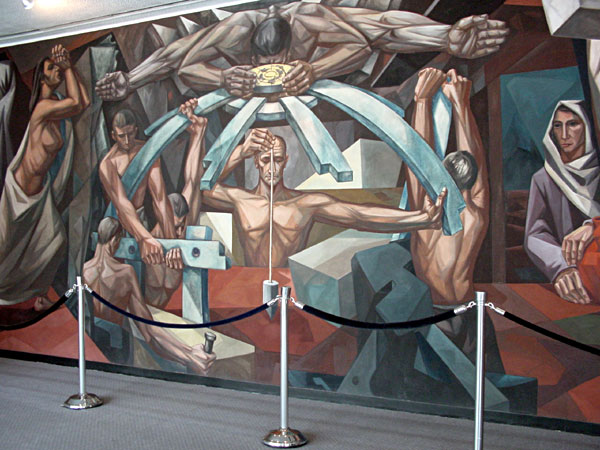
We are living at a time where democracy is challenged on a variety of levels, domestically and internationally. There exist several attempts to actively discourage people from seeking democracy, to use internal contradictions within democratic countries in order to legitimatize democracy itself, or to even undermine and destroy democracy where it exists. We cannot be in denial about this, and we must actively counter such efforts.
Why is this necessary?
Democracy may be the most stable political system in many ways, but it has a core weakness: Democracy needs democratically minded people in order to continue to exist. If the people themselves are convinced – rightly or wrongly – that democracy does not benefit them, they will be in danger of losing democracy.
Now, it could be argued that surely, democracy is not the only political system. Certainly, there are alternatives – but they are all much worse. Only democracy guarantees the dignity of the individual, and recognizes the sovereignty of the people and the need to organize governments around these two principles. Both principles merely reflect the reality of how power works: those in power always rely on those recognizing that their power is legitimate, and in the ultimate consideration, it always is the people whose recognition needs to be sought.
This is why any alternative to democracy is inherently unstable, and humanity has learnt this throughout its long history of failed regimes, failed successions, revolutions, counter-revolutions, uprisings, rebellions, coups, ethnic cleansings, genocides and wars. Such violence is oftentimes unleashed because of the instability of political power that does not rest solidly in the will of the people – not as a mass but as individuals voluntarily agreeing to come together and form a society. Undemocratic or autocratic regimes – dictatorships, monarchies, juntas, oligarchies, one-party states – all have to overcome the problem of legitimacy, which – even if it is solved during the rule of an acceptable ruler – will eventually arise at the time of succession.
Democracy thus is not a culturally specific solution, but a practical solution to solve the problems of sovereignty, transition of power, and eliminate violence by sublimating and replacing it through elections and legal processes. No culture on Earth is predetermined to be either democratic or non-democratic. Every democracy on the planet right now had to overcome non-democratic traditional rule.
When democracies are not stable internally, when internal contradictions – typically based on class, race, ethnicity, region, caste, gender, family bonds, clans etc. – are too strong, they will be difficult to maintain. This is why a focus on social justice goes hand in hand with democracy in order to alleviate such differences. Additionally, representative democracy, separation of powers and checks and balances will be necessary to negotiate different interests; in some cases, forms of federalism will also be helpful (but not all democratic countries are federally organized).
These questions of justice are part of the necessity to see democracy as a global project, mainly because human populations are not static and migration and trade are constant factors in human history. No country can isolate itself from others. Democracies will always pose a challenge to autocracies and their populations: Why do people in autocracies have limited freedoms, while people in democratic countries are even able to change their governments peacefully? To autocracies, the very existence of democracy is a threat, which is why democratic countries typically cooperate with each other and are interested in the rise of democracy in a global context. The more countries are democratic, the safer democracy is in the world, and the more justice will be done to the world’s people.
As you can see, I am trying to explain that there are concrete practical benefits to democratic rule – and that it would be immoral to argue that such benefits should not be made available for all.
Now, as mentioned twice before, this will only be a realistic vision – a world full of democracies – if democratic countries do their own “homework” and solve its internal contradictions. This means, for instance:
- Maintaining a healthy culture of discourse, critique and democratic exchange
- Educating the people about their rights and responsibilities as citizens
- Involving as many people in the organization of politics – be it as politicians, educators, journalists, citizen journalists, community leaders, volunteers, or simply as active citizens
- Actively promoting the participation of everyone in society in a meaningful way
- Striving for social justice and overcoming obstacles to participation in civic life and society
- Guaranteeing rights for demographic and political minorities
- Solving practical issues like homelessness, poverty, health disparities, lack of education, safety and opportunities to access culture, nature, fulfilling jobs, etc.
- Living up to the promises that anybody, from any background, is given the realistic opportunity to lead a fulfilling and happy life
But this homework is one that is typically only ever undertaken by democratic societies. Are democratic countries perfect? Certainly not. Are non-democratic countries any better? Absolutely not!
There is no alternative to democracy if the lives of the people matter at all. Those of us who have the privilege of living in a democratic country, we may complain, we may critique, we may rail against our “system” – but we do typically know that it won’t be better in non-democratic countries – and populations from those countries do know that as well, which is why we are experiencing so much immigration towards the democratic countries currently.
Democracy is and always has been the only hope for a just polity. This hope needs to be global – and hopefully, eventually, it will be shared by all, and fulfilled for all.
But that doesn’t just happen on its own – it requires all our work and dedication.

